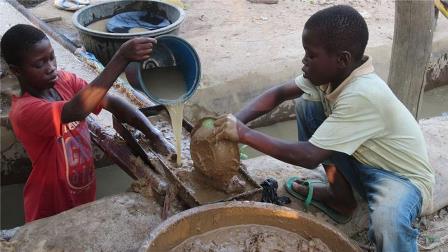Ghana’s mining industry has been benefiting from child labour in unlicensed mines, Human Rights Watch has said, after conducting field observations in the in the Western, Central and Ashanti Regions.
It is estimated that thousands of children, mostly between the ages of 15 and 17, have been working in perilous conditions pulling ore out of shafts and processing it with toxic mercury violating Ghanaian and international law, it was stated in the 82-page report released on Friday.
With the lack of “due diligence” and many foreign companies buying gold from the country, which is one of the world’s top gold producers, child rights and labour stand poorly regulated.
Ghana’s Children’s Act prohibits mining work for anyone under the age of 18.
However, lax enforcement of the law and a lack of systematic inspections have led to continued child labour within the mining industry.
The hazardous conditions have led to a number of injuries, respiratory problems, pain and one death which occurred after a mine collapsed. The children also risk brain damage and other lifelong disabilities from mercury poisoning.
“Some work may be acceptable for children, but Ghana’s unlicensed gold mines are very dangerous places where no child should work,” said Juliane Kippenberg, a senior children rights researcher at HRW.
Most of the children working in the mines attend school, with some working to cover school-related costs.
Many attend school irreguarly and others eventually drop out. The main issue is that small-scale mines are poorly regulated in Ghana, the rights group said.
The majority of mines operate without mining licences which are costly and difficult to obtain.
Additionally, the use of mercury, which is especially harmful to children, for artisanal gold mining is allowed according to Ghanaian law.
Many local gold traders have done little to determine whether the purchased product has been produced by child labour, and regularly buy gold from unlicensed mining sites.
Three of Ghana’s largest gold exporting companies said they had at times bought gold that could not be traced back to its origin. Only one said it bought gold exlusively from licensed mines.
The lack of appropriate enforcement and protection by government institutions dealing with child labour has lent itself to continued violations, HRW mentioned.
The group noted that the Ghanaian government should address underlying causes of child labour and undertake fundamental reforms to regulate, professionalise the artisanal and small-scale mining sector.
“Ghana should lead the way in Africa by developing a comprehensive strategy for safe, professional, and child labor-free gold mining,” Kippenberg said. “That way, Ghana’s gold can truly improve the lives of Ghanaian children.”
FRENCH VERSION
On estime que des milliers d’enfants, surtout entre les âges de 15et 17, travaillent dans des conditions périlleuses tirant mineraid’arbres et de traiter avec du mercure toxique violent le droitghanéen et internationaux, il a été indiqué dans le rapport de 82 pages publié vendredi.
Avec l’absence de « due diligence » et beaucoup d’entreprisesétrangères acheter de l’or du pays, qui est l’un des principauxproducteurs d’or du monde, du travail et droits de l’enfant se tenir mal réglementées.
Loi sur les enfants du Ghana interdit le travail minier pour toute personne âgée de 18 ans.
Toutefois, une application laxiste de la Loi et l’absence decontrôles systématiques ont conduit au travail des enfantscontinue au sein de l’industrie minière.
Les conditions dangereuses ont conduit à un certain nombre deblessures, de problèmes respiratoires, de douleurs et d’un décèssurvenu après qu’une mine s’est effondrée. Les enfants risquentégalement de lésions cérébrales et autres handicaps tout au longde l’empoisonnement au mercure.
« Certains travaux peuvent être acceptable pour les enfants, maissans permis mines d’or du Ghana sont des endroits trèsdangereux où aucun enfant ne devrait fonctionner, » dit JulianeKippenberg, chercheur senior enfants droits à HRW.
La plupart des enfants travaillent dans les mines à l’école, avec untravail pour couvrir les coûts liés à l’école.
Beaucoup fréquentent l’école irreguarly et par la suite, d’autresabandonnent. Le principal problème est que les petites exploitations minières sont mal réglementés au Ghana, dit degroupement pour les droits.
La majorité des mines fonctionne sans licences d’exploitation quisont coûteuses et difficiles à obtenir.
En outre, l’utilisation du mercure, qui est particulièrement nocivepour les enfants, pour l’extraction artisanale de l’or est autoriséeconformément à la loi ghanéenne.
Beaucoup de commerçants or local ont peu fait pour déterminersi le produit acheté a été produit par le travail des enfants etrégulièrement acheter de l’or provenant des sites miniers sans licence.
Trois d’or plus important du Ghana entreprises exportatrices ditqu’ils avaient à la fois achetée or qui ne peut pas être retracéejusqu’à son origine. Seul a dit qu’il a acheté exclusivement orprovenant des mines sous licence.
Le manque d’application appropriées et de la protection par lesinstitutions gouvernementales portant sur le travail des enfants ase prêtait aux violations continues, a indiqué HRW.
Le groupe a noté que le gouvernement ghanéen devrait attaqueraux causes sous-jacentes du travail des enfants et entreprendredes réformes fondamentales pour réglementer, deprofessionnaliser le secteur de l’exploitation minière artisanale età petite échelle.
« Ghana devrait montrer la voie en Afrique en mettant au pointune stratégie globale pour l’orpaillage sécuritaire, professionnelet sans travail des enfants, » a déclaré Kippenberg. « De cettefaçon, or du Ghana peut vraiment améliorer la vie des enfantsGhanéens. »


